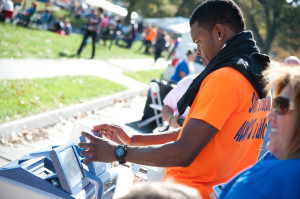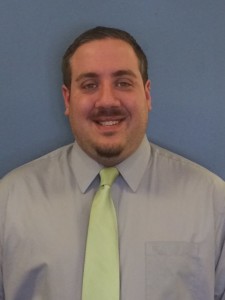 As I sat down to write this blog entry about the intersection of the Dominican Tradition and the Division of Student Services, I began to think about the various ways that we embody the tradition and Dominican heritage of Albertus. Student Services is intrinsically Dominican. There are four pillars of the Dominican Order: prayer, study, community and service. In our own way, the professional staff of Student Services engages students in each of these four pillars. This past August during New Student Orientation, the Campus Activities & Orientation staff introduced the four pillars by placing them on the new student t-shirt to begin engaging the students from day one. Residential Life promotes the pillars through in-hall programming and bulletin boards. We offer twenty-four hour quiet living and designate quiet hours nightly to promote study in line with our academic mission. There is one pillar that truly represents what the Division of Student Services works to achieve in their work: Community.
As I sat down to write this blog entry about the intersection of the Dominican Tradition and the Division of Student Services, I began to think about the various ways that we embody the tradition and Dominican heritage of Albertus. Student Services is intrinsically Dominican. There are four pillars of the Dominican Order: prayer, study, community and service. In our own way, the professional staff of Student Services engages students in each of these four pillars. This past August during New Student Orientation, the Campus Activities & Orientation staff introduced the four pillars by placing them on the new student t-shirt to begin engaging the students from day one. Residential Life promotes the pillars through in-hall programming and bulletin boards. We offer twenty-four hour quiet living and designate quiet hours nightly to promote study in line with our academic mission. There is one pillar that truly represents what the Division of Student Services works to achieve in their work: Community.
One of the major tenets of Albertus Magnus College’s mission statement is “the search for truth in all its dimensions.” The search for such truth is not solely an individual pursuit. As administrators in the student services division, we are in a unique position to influence this truth-seeking through the promotion of community. Together, we can navigate our collective experiences and find the truth in all its dimensions. Community is not simply living together, working together or being together—it’s about identifying how we are similar and working to engage others in those similarities. We learn the best from each other.
Albertus Magnus College is a community of diverse students, faculty and staff. The faculty and staff work together to provide our students with a quality education and prepare them to be thoughtful and committed citizens of a global society; however, in Student Services, we not only prepare them for their futures, but we engage them in their own student experience. As a division, we promote community through various programming opportunities both campus-wide and in the residence halls, as well as through various leadership opportunities. We strive to bring our students together and engage them in fun activities and experiences.
Community also promotes the idea of friendship. Donald Grogen, O.P., author of “The Pillars Revisited: a fresh look at Dominican Spirituality,” wrote about the idea of friendship in relation to community. The article speaks to the value of relationship or kinship. In student services, we promote the idea of friendship through gathering students to participate in activities on-campus that promote the making new friendships and the deepening of current friendships. A portion of New Student Orientation includes the new students and their student orientation counselors to meet and get to know one another, but also participate in icebreakers. This interaction promotes community building through the cultivation of friendship. The residential life staff uses the same method as a starting point to foster community in the residence halls for the year. The Student Government Association integrates friendship through the “Best Friends Gameshow.”
In Student Services, we do not only work to promote the Dominican heritage or the pillar of community, but we work to integrate it as well. Integration is where the work really starts to happen and meaningful relationships begin to blossom. Community is based on shared ideals, relationships and experiences—and that is what Student Services strives to accomplish through our work with students.

Submitted by Justin Cirisoli
Director of Residential Life
Justin Cirisoli is the director of residential life since November 2012. He began working in the Division of Student Services in August 2010 as the campus activities intern. In addition to serving as an intern, he also held the roles of assistant hall director and interim resident director prior to his appointment as resident director in May 2012. He has a bachelor of arts degree in history from Roger Williams University and in May 2015 will be conferred a master of science degree in counseling and student development in higher education from Central Connecticut State University. In May 2013, he and a student traveled to Fanjeaux, France with representatives from ten Dominican colleges and universities to study, reflect, and engage in the place where St. Dominic founded the Order in the thirteenth century.
